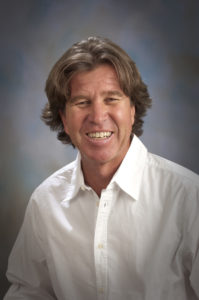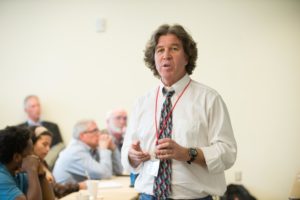There are few people who know Colorado soil as well as Professor Gene Kelly. As a professor of pedology and former head of Colorado State University’s Department of Soil and Crop Sciences, Kelly is an expert in soil science, ecosystem ecology, sustainable agriculture and environmental forensics.
Kelly is now leveraging that knowledge and his research experience in his new role as deputy director of the Colorado Agricultural Experiment Station, or AES, and associate dean for Extension.

AES, housed in CSU’s College of Agricultural Sciences, is the administrative entity that oversees eight research centers across the state of Colorado. These centers conduct research that addresses the economic viability, environmental sustainability and social acceptability of activities impacting agriculture, natural resources and consumers in Colorado. Researchers housed at the centers focus their work on commodities and sustainable management of agricultural landscapes.
As associate dean for Extension, Kelly will help facilitate the Extension activities of faculty members across the campus, especially those housed within the college. Faculty members with Extension appointments connect their research with local communities through workshops and hands-on interactions. Extension appointments are part of some faculty appointments and come in addition to teaching and research. Linking work of AES with Extension will make CSU’s research presence across the state more visible and increase the efficiency of putting research results in the hands of farmers, ranchers and land managers.
Kelly, who has been a part of the CSU faculty since 1989, feels that the work underway at the centers offers a unique opportunity to combine scientific research with community engagement. He believes that this work will provide better information, tools, opportunities and incentives to make decisions that maintain and enhance water and air quality, soil health, biodiversity and human quality of life now and in the future.
Since beginning his new appointment on Oct. 1, Kelly has been traveling around the state to meet with faculty and staff at the centers to gain a better understanding of the research taking place and how CSU’s work is affecting communities with diverse geographies and climates.

“We’re at a time of unprecedented access to data and increased ability to share and move large amounts of data,” Kelly said. “I think this has the potential to be transformative in the agricultural, ecological and environmental work supported by AES and our research centers across the state.”
This transformation, he explained, is not a matter of altering the core purpose of our science — to understand how agricultural and natural systems function and to use this understanding to inform management and policy decisions — but rather of expanding researchers’ perspectives to include new variables, new data sources and new environments to investigate.
“There are also many benefits to establishing integrated livestock and crop management systems,” Kelly added. “These have the potential to have a profound influence on soil health and nutrient management in our agricultural landscapes.”
“Gene is a national and international expert in pedology and related scientific inquiries, and his work has contributed to major breakthroughs with regard to our understanding of soil formation, the role of plants in soil evolution, and the place of soils in the global agricultural ecosystem,” said Ajay Menon, dean of the College of Agricultural Sciences. “His impressive record as a research scientist, teacher and faculty member will serve him well in this new role.”
After rising through the ranks from assistant professor to department head, Kelly took a leave of absence in 2015 to serve as visiting head scientist and interim CEO of the National Ecological Observatory Network, or NEON, in Boulder, Colo. NEON is a continental-scale ecological observation facility, sponsored by the National Science Foundation and operated by Battelle, that gathers and synthesizes data on the impacts of climate change, land use change and invasive species on natural resources and biodiversity.
Kelly is a two-time CSU graduate with a bachelor’s degree in forest and range management (‘80) and a master’s degree in soil science (’84). He went on to earn a Ph.D. in soil science from the University of California-Berkeley in 1989. He is a fellow of the Soil Science Society of America and the 2016 recipient of the prestigious Soil Science Research Award.
